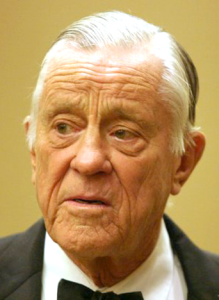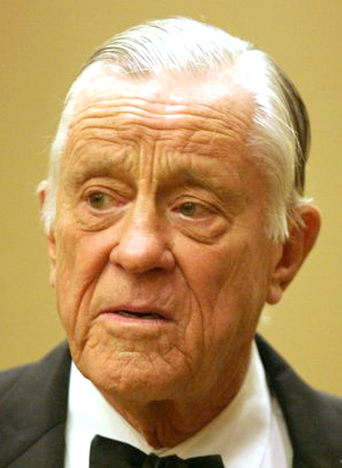
Ben Bradlee, the Washington Post editor who guided the paper through the Pentagon Papers and Watergate, was a Washington D.C. legend. But the longtime Georgetown resident also left a distinct legacy on the Hilltop, where he taught a journalism course and received an honorary degree.
Bradlee took over the Post in 1965 and presided over the newsroom until 1991. Under his leadership, the Post earned 18 Pulitzer Prizes, solidifying its national prominence. During his time as editor, Bradlee challenged the Nixon administration’s right to the Pentagon Papers and supervised Bob Woodward and Carl Bernstein’s investigation into the Watergate cover-up in 1971. He died of natural causes at the age of 93 on Oct. 21.
After leaving the Post, Bradlee spent time at the university located near his N Street home. He taught a journalism course in the spring of 1997 and received an honorary Doctor of Humane Letters from the university in 2006.
“[Bradlee] has helped to strengthen the teaching of journalism at Georgetown College, in part through his own teaching, and has readily shared with our students his professional perspective, his sense of ethics and his inspirational devotion to that elusive but cherished journalistic objective: the truth,” University President John J. DeGioia said at the time.
His wife, Sally Quinn, has also been connected to Georgetown through the Post’s former blog on religion, On Faith.
Bradlee’s relationship with Georgetown began as research for a book called “How to Read a Newspaper.” After publishing his autobiography, “A Good Life: Newspapering and Other Adventures” in 1995, Bradlee planned to follow up with the second work. To prepare, he taught a class with Barbara Feinman Todd, now Georgetown’s director of undergraduate journalism, who served as his researcher for “A Good Life.”
“I suggested to him that if he came and co-taught a class with me at Georgetown, maybe it would help him flesh out the book,” Feinman Todd said.
The course was also titled “How to Read a Newspaper.” It met once a week and trained students to become sophisticated readers of the news, understanding when and how sources lie, with a particular interest in anonymous sources. Pulling from his experience as an editor, Bradlee attempted to give students his insider’s perspective on reading and writing for a newspaper.
“He had a certain swagger and confidence about him that made it clear that you felt like you were sitting in front of someone who has made history,” said Suzanne Smalley (COL ’98), a student in the class and current senior director of content and strategy for AtlanticLIVE at The Atlantic. “He had incredible war stories to tell and a very rich memory for critical history in this country that he lived through and covered for the Post.”
Although Bradlee never ended up writing his second book, his enthusiasm for the class and passion for journalism was boundless. He read and co-graded every assignment with Feinman Todd.
“He loved teaching the class. It was a good sounding board for his book idea, and he loved the interaction with the students,” Feinman Todd said. “He loved life so much. Every day he got up, and he was so happy to be doing what he was doing. I can’t imagine him having had a different life. He was born to be a newspaper editor, and it was a joy to be in the room with somebody who was so alive and so comfortable in his own skin.”
The small course, with fewer than 20 students selected through an application process, featured several guest speakers, including Washington Post publisher Katharine Graham, ESPN Vice President John Walsh and Woodward.
“It was clear whenever these incredible icons came into the classroom, they all had tremendous respect for Professor Bradlee,” Smalley said. “It wasn’t the most structured class I took at Georgetown, but it was one of the more interesting ones.”
Bradlee also connected with journalists and others now at Georgetown outside of his later-in-life work on the Hilltop.
Journalism professor Athelia Knight worked as a reporter for the Post under Bradlee from 1974 to 1991, where she covered topics including education, social issues, criminal justice, and sports, and credited him with constantly motivating her to improve.
“He took a chance on me because I was a young, rookie reporter who was basically thrown in with all the other Metro reporters, and I survived,” Knight said. “He was tough as nails. I liked that because he pushed me. He pushed me to become a better reporter.”
Knight and Feinman Todd still recalled Bradlee’s professional advice years later.
“Go back, go back, go back. We were trying to get to the truth, and when you’re interviewing someone, the first time, they don’t tell you everything. The second time, the third time,” Knight said. “It’s really checking your facts and getting it right. And if you don’t have it, you don’t have it.”
“‘Never send a letter when you’re angry.’ I think about that almost every time I hit the send button on something that’s difficult,” Feinman Todd added. “He always warned … people can lie to you. So be open to people, but you always need as many sources as you can get. So be careful, don’t be cynical, I would say,” Feinman Todd said.
Despite his stature and even after his time teaching at Georgetown, Bradlee took the time to further the development of young journalists. From 2001 to 2008, Knight ran The Washington Post’s Young Journalist Development Program for high school students interested in journalism, and Bradlee occasionally stopped by to speak to the students.
“I got Bradlee to speak to the students more than once, and he was very generous with his time. He was willing to take pictures with the kids; he was willing to just talk to them about his career,” Knight said. “He never really stopped being excited about the news.”
Feinman Todd agreed that Bradlee always made the time to connect with students.
“He made himself available to the students, and he was there for them, not only for the class but for real-world, real journalism advice,” she said.
Bradlee’s funeral will take place at Washington National Cathedral on Wednesday at 11 a.m.
Hoya Staff Writer Suzanne Monyak contributed reporting.





















